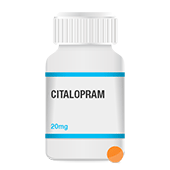

Citalopram (Celexa)
 Citalopram (Celexa) is an antidepressant in a group of drugs called selective serotonin reuptake inhibitors (SSRIs). Citalopram is used to treat depression. Citalopram may also be used for purposes not listed in this medication guide.
Citalopram (Celexa) is an antidepressant in a group of drugs called selective serotonin reuptake inhibitors (SSRIs). Citalopram is used to treat depression. Citalopram may also be used for purposes not listed in this medication guide.
Citalopram FAQ
Your order will arrive between 1-3 business days after verifying your order by phone.
Nearly All packages are delivered by USPS. A minority of orders may be delivered through other smaller carriers.
We charge a standard $19.95 for Priority Mail and $39.95 for Express Mail for all orders within the 48 continental U.S. states.
We accept Visa, MasterCard, and ACH (e-checks)
Citalopram Information
Important information
You should not use citalopram if you are allergic to it, if you also take pimozide, or if you are being treated with methylene blue injection. Do not use citalopram if you have taken an MAO inhibitor in the past 14 days. A dangerous drug interaction could occur. MAO inhibitors include isocarboxazid, linezolid, phenelzine, rasagiline, selegiline, and tranylcypromine. Some young people have thoughts about suicide when first taking an antidepressant. Your doctor will need to check your progress at regular visits while you are using citalopram. Your family or other caregivers should also be alert to changes in your mood or symptoms. Report any new or worsening symptoms to your doctor, such as: mood or behavior changes, anxiety, panic attacks, trouble sleeping, or if you feel impulsive, irritable, agitated, hostile, aggressive, restless, hyperactive (mentally or physically), more depressed, or have thoughts about suicide or hurting yourself.
Before taking this drug
You should not use citalopram if you are allergic to it, if you also take pimozide, or if you are being treated with methylene blue injection. Do not use citalopram if you have taken an MAO inhibitor in the past 14 days. A dangerous drug interaction could occur. MAO inhibitors include isocarboxazid, linezolid, phenelzine, rasagiline, selegiline, and tranylcypromine. To make sure citalopram is safe for you, tell your doctor if you have: a bleeding or blood clotting disorder; liver or kidney disease; seizures or epilepsy; heart disease, heart failure, a heart rhythm disorder, slow heartbeats, or recent history of heart attack; personal or family history of Long QT syndrome; an electrolyte imbalance (such as low levels of potassium or magnesium in your blood); bipolar disorder (manic depression); or a history of drug abuse or suicidal thoughts. Some young people have thoughts about suicide when first taking an antidepressant. Your doctor will need to check your progress at regular visits while you are using citalopram. Your family or other caregivers should also be alert to changes in your mood or symptoms.
Taking an SSRI antidepressant such as citalopram during pregnancy may cause serious lung problems in the baby. However, you may have a relapse of depression if you stop taking your antidepressant. Tell your doctor right away if you become pregnant while taking citalopram. Do not start or stop taking this medicine during pregnancy without your doctor's advice.
Citalopram can pass into breast milk and may harm a nursing baby. You should not breast-feed while you are using citalopram. Do not give this medication to anyone under 18 years old without medical advice.
How should I take citalopram?
Take citalopram exactly as prescribed by your doctor. Follow all directions on your prescription label. Your doctor may occasionally change your dose to make sure you get the best results. Do not take this medicine in larger or smaller amounts or for longer than recommended. Measure liquid citalopram with a special dose-measuring spoon or medicine cup. If you do not have a dose-measuring device, ask your pharmacist for one. It may take 4 weeks or longer before your symptoms improve. Keep using the medication as directed and tell your doctor if your symptoms do not improve after 4 weeks of treatment. Do not stop using citalopram suddenly, or you could have unpleasant withdrawal symptoms. Ask your doctor how to safely stop using citalopram. Store at room temperature away from moisture and heat.
What happens if I miss a dose?
Take the missed dose as soon as you remember. Skip the missed dose if it is almost time for your next scheduled dose. Do not take extra medicine to make up the missed dose.
What happens if I overdose?
Seek emergency medical attention or call the Poison Help line at 1-800-222-1222.
What should I avoid?
Ask your doctor before taking a nonsteroidal anti-inflammatory drug (NSAID) for pain, arthritis, fever, or swelling. This includes aspirin, celecoxib, diclofenac, indomethacin, meloxicam, and others, and others. Using an NSAID with citalopram may cause you to bruise or bleed easily. Drinking alcohol can increase certain side effects of citalopram. This medicine may impair your thinking or reactions. Be careful if you drive or do anything that requires you to be alert.
Citalopram side effects
Get emergency medical help if you have any of these signs of an allergic reaction to citalopram: skin rash or hives; difficulty breathing; swelling of your face, lips, tongue, or throat. Report any new or worsening symptoms to your doctor, such as: mood or behavior changes, anxiety, panic attacks, trouble sleeping, or if you feel impulsive, irritable, agitated, hostile, aggressive, restless, hyperactive (mentally or physically), more depressed, or have thoughts about suicide or hurting yourself. Call your doctor at once if you have: very stiff (rigid) muscles, high fever, sweating, confusion, fast or uneven heartbeats, tremors, feeling like you might pass out; agitation, hallucinations, overactive reflexes, nausea, vomiting, diarrhea, loss of coordination, feeling like you might pass out; headache with chest pain and severe dizziness, fainting, fast or pounding heartbeats; or headache, slurred speech, severe weakness, muscle cramps, feeling unsteady, seizure (convulsions), shallow breathing (breathing may stop). Common citalopram side effects may include: drowsiness, tired feeling; sleep problems (insomnia); mild nausea, diarrhea, upset stomach, dry mouth; cold symptoms such as stuffy nose, sneezing, sore throat, cough; increased sweating or urination, weight changes; or decreased sex drive, impotence, or difficulty having an orgasm. This is not a complete list of side effects and others may occur. Call your doctor for medical advice about side effects.
Citalopram dosing information
Usual Adult Dose of Citalopram for Depression: Initial dose: 20 mg orally once a day. Maintenance dose: 20 to 40 mg/day. The initial dose may be increased in 20 mg increments not more often than once a week up to a maximum of 40 mg per day. Usual Geriatric Dose for Depression: 20 mg/day orally is the maximum recommended dose for patients who are greater than 60 years of age. Usual Pediatric Dose for Depression: Children Up To 11 Years: Initial dose: 10 mg orally once daily; increase dose slowly by 5 mg/day every 2 weeks as clinically needed; dosage range: 20 to 40 mg/day 12 to 18 Years: Initial: 20 mg orally once daily; increase dose slowly by 10 mg/day every 2 weeks as clinically needed; dosage range: 20 to 40 mg/day Usual Pediatric Dose of Citalopram for Obsessive Compulsive Disorder: Children Up To 11 years: Initial: 5-10 mg/day given once daily; increase dose slowly by 5 mg/day every 2 weeks as clinically needed; dosage range: 10 to 40 mg/day. 12 to 18 years: Initial: 10 to 20 mg/day given once daily; increase dose slowly by 10 mg/day every 2 weeks as clinically needed; dosage range: 10 to 40 mg/day.
What other drugs will affect citalopram?
Taking citalopram with other drugs that make you sleepy or slow your breathing can increase these effects. Ask your doctor before taking citalopram with a sleeping pill, narcotic pain medicine, muscle relaxer, or medicine for anxiety, depression, or seizures. Ask your doctor before taking a nonsteroidal anti-inflammatory drug (NSAID) for pain, arthritis, fever, or swelling. This includes aspirin, celecoxib, diclofenac, indomethacin, meloxicam, and others, and others. Using an NSAID with citalopram may cause you to bruise or bleed easily. Many drugs can interact with citalopram. Not all possible interactions are listed here. Tell your doctor about all your medications and any you start or stop using during treatment, especially: cimetidine; lithium; St. John's wort; tramadol; tryptophan (sometimes called L-tryptophan); heart rhythm medication - amiodarone, dofetilide, disopyramide, dronedarone, flecainide, ibutilide, procainamide, propafenone, quinidine, sotalol; medicines to treat psychiatric disorders - chlorpromazine, fluphenazine, haloperidol, iloperidone, paliperidone, perphenazine, pimozide, prochlorperazine, quetiapine, risperidone, thioridazine, trifluoperazine, ziprasidone; migraine headache medicine - sumatriptan, zolmitriptan; or other antidepressants - amoxapine, amitriptyline, clomipramine, desipramine, doxepin, fluoxetine, imipramine, maprotiline, nortriptyline, protriptyline, trimipramine. This list is not complete and many other drugs can interact with citalopram. This includes prescription and over-the-counter medicines, vitamins, and herbal products. Give a list of all your medicines to any healthcare provider who treats you.
Citalopram Search Terms
Where can i buy celexa overnight shipping. Mail order celexa on-line from usa pharmacies. Purchase cheap celexa generic with free prescription. How to get citalopram online us drugstores. Best place to buy real celexa for anxiety.



